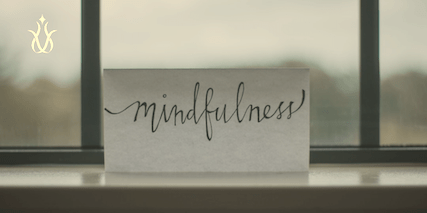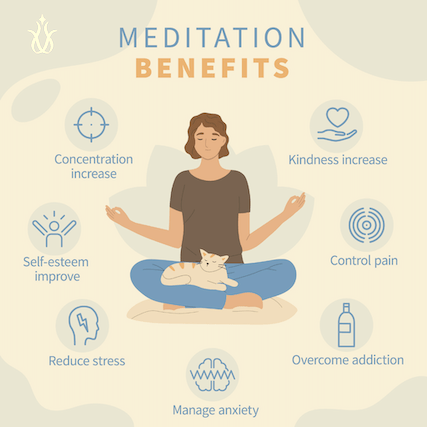Curious about mindfulness? Get all your questions answered in our comprehensive guide, where we delve into the what, why, and how of mindfulness practice, its benefits, and practical tips for incorporating mindfulness into your daily life.
What is Mindfulness?
Mindfulness is a state of active, open attention to the present moment. It involves intentionally directing our awareness to our thoughts, feelings, bodily sensations, and the surrounding environment without judgment or attachment. In essence, mindfulness is about being fully present and engaged in the present moment.
The practice of mindfulness originates from Buddhist traditions but has been adapted and widely studied in contemporary psychology and wellness practices. It involves cultivating a non-judgmental awareness of our thoughts and experiences, allowing us to observe them without getting caught up in them or reacting impulsively.
Through mindfulness training, we develop the ability to observe our thoughts and emotions with curiosity and acceptance rather than being carried away by them. It helps us become more attuned to our internal experiences and external surroundings, leading to greater clarity, self-awareness, and emotional resilience.
Mindfulness can be practised formally through meditation, where individuals set aside specific time to engage in focused awareness exercises. It can also be incorporated into daily life through informal practices, such as bringing mindful attention to routine activities like eating, walking, or interacting with others.
Numerous scientific studies have demonstrated the benefits of mindfulness for mental and physical well-being. It has been shown to reduce stress, anxiety, and depression and enhance overall psychological resilience. Additionally, mindfulness practice has been associated with improved cognitive functions, better emotional regulation, increased self-compassion, and improved relationships.
It’s worth noting that mindfulness is a skill that can be cultivated with regular practice and training. Many mindfulness programs and courses are available, ranging from structured mindfulness-based stress reduction (MBSR) programs to guided meditation apps. It’s important to approach mindfulness with an open and non-judgmental attitude, allowing yourself to explore and experience the present moment with curiosity and kindness.

What’s Another word for Mindfulness?
Several synonyms for “mindfulness” could be:
Awareness
Consciousness
Alertness
Attentiveness
Wakefulness
Presence
Consideration
Observance
Sensitivity
Thoughtfulness
Carefulness
Vigilance
Perception
While all these words can be considered synonyms for mindfulness, they may not perfectly capture its full meaning in every context. “Mindfulness” in the context of meditation and mental health often refers to a state of being fully present, aware of where we are and what we’re doing, and not overly reactive or overwhelmed by what’s going on around us. It implies an element of non-judgmental observation and acceptance.
How Does Mindfulness Work?
Mindfulness works by training your attention and awareness to be fully present in the present moment without judgment. It involves intentionally directing your attention to the sensations of the body, the breath, thoughts, and emotions, as well as the external environment.
Here’s how mindfulness works:
Attention and Focus: Mindfulness involves consciously directing your attention to a specific focal point, such as the breath, body sensations, or the present moment. By focusing your attention, you become more aware of the present experience and less caught up in thoughts about the past or worries about the future.
Non-judgmental Awareness: Mindfulness training encourages an attitude of non-judgmental awareness towards your experiences. This means observing thoughts, emotions, and sensations as they arise without labelling them as good or bad. Instead of reacting or getting carried away by them, you cultivate a sense of curiosity and acceptance.
Emotional Regulation: Mindfulness helps you develop a greater awareness of your emotions and how they manifest in your body. With practice, you can observe difficult or negative emotions without immediately reacting to them, allowing you to respond to them in a more skilful way. Mindfulness can support emotional regulation by creating a gap between the stimulus and your response, allowing you to choose how to act instead of being driven by automatic reactions.
Stress Reduction: Mindfulness has been shown to reduce stress by activating the relaxation response and calming the body’s stress systems. Regular mindfulness practice can decrease the production of stress hormones and promote a state of relaxation, leading to a greater sense of well-being.
Cognitive Flexibility: Mindfulness practice can enhance cognitive flexibility, which is the ability to shift perspectives, adapt to new situations, and let go of rigid thought patterns. By observing your thoughts with a non-judgmental mindset, you can become aware of repetitive or unhelpful thinking patterns and choose to respond in a more adaptive way.
Increased Self-awareness: Mindfulness cultivates self-awareness, allowing you to have a clearer understanding of your thoughts, emotions, and behavioural patterns. With this increased self-awareness, you can make conscious choices aligned with your values and goals, leading to greater personal growth and well-being.
Improved Focus and Concentration: Regular mindfulness practice has been shown to improve focus and concentration. By training your attention to stay present and resist distractions, you can enhance your ability to stay focused on tasks and activities in your daily life.
It’s important to note that the benefits of mindfulness develop over time with consistent practice. The more you practice mindfulness exercises and integrate mindfulness into your daily life, the more profound and lasting the effects can be.
What is Mindful Meditation?
Mindful meditation is a form of meditation that involves cultivating present-moment awareness and non-judgmental attention to one’s thoughts, sensations, and surroundings. It is rooted in mindfulness, which is the practice of paying attention to the present moment on purpose, without judgment.
During mindful meditation practice, the practitioner focuses their attention on a specific anchor, such as the breath, bodily sensations, or sounds, and aims to observe their experiences with an open and accepting attitude. The goal is to become fully aware of the present moment, including thoughts, emotions, and physical sensations, without getting caught up in them or reacting to them.
Mindful meditation is often practised in a seated position, with eyes closed or softly focused. The practitioner directs their attention to the chosen anchor, and whenever they become aware of the mind wandering, they gently bring their attention back to the anchor without judgment or criticism.
Mindful meditation practice has been shown to have various benefits, including reducing stress, improving focus and concentration, promoting emotional well-being, and enhancing self-awareness. It is commonly used as a tool for managing anxiety, depression, and other mental health conditions, as well as for promoting overall well-being and personal growth.
It is important to note that mindfulness is a skill that requires regular practice and patience. Over time, with consistent practice, the ability to be present in the moment and cultivate a non-judgmental awareness can be developed and integrated into daily life, leading to a greater sense of peace, clarity, and resilience.

How do you practice Mindfulness Meditation?
Practising mindfulness meditation involves setting aside dedicated time to cultivate present-moment awareness and develop a non-judgmental attitude towards your thoughts and experiences.
Here are some steps to guide you in practising mindfulness meditation:
Find a quiet and comfortable space: Choose a location where you can sit quietly without distractions. It can be a designated meditation area or simply a peaceful corner in your home.
Assume a comfortable posture: Sit in a position that allows you to be both relaxed and alert. This can be sitting cross-legged on a cushion, on a chair with your feet flat on the ground, or even lying down if that’s more comfortable for you.
Focus on your breath: Start by bringing your attention to your breath. Notice the sensation of each inhale and exhale without trying to control or manipulate it. Use your breath as an anchor to keep you grounded in the present moment.
Observe your thoughts and sensations: As you sit with your breath, thoughts, positive or negative emotions, and physical sensations will arise. Rather than getting caught up in them or judging them, simply observe them with curiosity and without attachment. Notice them as passing phenomena and bring your attention back to your breath whenever you become distracted.
Expand your awareness: Once you feel settled with your breath, you can broaden your awareness to include other aspects of your experience. Notice any bodily sensations, sounds, or the environment around you. Allow everything to come and go without judgment.
Cultivate a non-judgmental attitude: Throughout the practice, try to maintain an attitude of acceptance and non-judgment. Instead of labelling experiences as good or bad, simply observe them as they are, acknowledging them with an open and compassionate mindset.
Practice regularly: Like any skill, mindfulness meditation benefits from regular practice. Set aside a dedicated time each day, even if it’s just a few minutes, to engage in this practice. Consistency is more important than duration, so start with a manageable time frame and gradually increase it as you build your practice.
Remember that mindfulness meditation is a personal journey, and everyone’s experience may be different. Be patient and gentle with yourself, allowing the practice to unfold naturally. Over time, you may notice an increased sense of calm, clarity, and overall well-being in your daily life.

Why is Mindfulness Important
Mindfulness is important because it offers numerous benefits for our mental, emotional, and physical well-being.
Here are some key reasons why mindfulness is important:
Stress Regulation: Mindfulness practice has been shown to effectively reduce stress levels. By cultivating present-moment awareness and non-judgmental acceptance, mindfulness helps us become more resilient in the face of stressors and develop healthier coping mechanisms.
Emotional Regulation: Mindfulness allows us to observe our emotions without getting carried away by them. By developing a greater awareness of our emotions in the present moment, we can respond to them in a more skilful and balanced way, rather than reacting impulsively or getting overwhelmed.
Improved Mental Health: Mindfulness interventions have been found to be effective in reducing anxiety symptoms, recurrent depression, and other mental health benefits. By bringing our attention to the present moment, we can gain a clearer perspective on our thoughts and feelings and develop a greater sense of self-compassion and acceptance.
Enhanced Focus and Concentration: Regular mindfulness practice can improve our ability to stay focused and concentrate on the task at hand. By training our attention to be more present, we can reduce distractions and improve our productivity and performance.
Increased Self-Awareness: Mindfulness cultivates a deep sense of self-awareness, allowing us to observe our thoughts, beliefs, and patterns of behaviour without judgment. This self-awareness enables us to make conscious choices aligned with our values and goals, leading to personal growth and transformation.
Better Relationships: Mindfulness enhances our ability to be fully present with others, to listen attentively, and to respond with empathy and kindness. This can greatly improve the quality of our relationships and communication, fostering understanding and connection.
Physical Health Benefits: Mindfulness has been associated with a range of physical health benefits, such as lowering heart disease risk, reduced blood pressure, improved sleep quality, enhanced immune function, and better pain management.
Overall, mindfulness helps us cultivate a deeper sense of peace, acceptance, and well-being in our lives. It allows us to fully engage with the present moment and make conscious choices that lead to greater happiness and fulfilment.
How Do I Learn Mindfulness?
Learning mindfulness can be done through various avenues and practices.
Here are some steps to help you get started with learning mindfulness:
Educate Yourself: Read books, articles, and research papers on mindfulness to gain a foundational understanding of the concept. Look for reputable sources written by experts in the field of mindfulness and meditation.
Attend Workshops or Classes: Seek out mindfulness workshops, courses, or classes offered in your local community or online. A mindfulness program can provide structured guidance and instruction from experienced teachers. Look for a mindfulness program that offers a progressive approach and covers the fundamentals of mindfulness practice.
Practice Mindful Meditation: Mindful meditation practice is the core of mindfulness. Set aside dedicated time each day to engage in formal mindfulness meditation. Start with shorter sessions, such as 5-10 minutes, and gradually increase the duration as you become more comfortable. There are many guided mindfulness meditation resources available online or through mobile apps that can assist you in your practice.
Incorporate Mindfulness into Daily Life: Mindfulness is not limited to formal meditation sessions. Bring mindfulness into your daily activities by consciously paying attention to the present moment. Engage in activities with full awareness, whether it’s eating, walking, or interacting with others. Be fully present and observe your thoughts, emotions, and body sensations without judgment.
Join a Mindfulness Group: Consider joining a local mindfulness group or finding an online community where you can connect with like-minded individuals who are also on a mindfulness journey. Sharing experiences, insights, and challenges with others can provide support and motivation.
Use Mindfulness Apps: Numerous mindfulness apps offer guided meditations, mindfulness exercises, and resources to support your practice. Popular apps include Headspace, Calm, Insight Timer, and 10% Happier.
Seek Guidance from a Teacher: If you feel the need for more personalised instruction or have specific questions about your mindfulness practices, consider seeking guidance from a qualified mindfulness teacher or meditation instructor. They can offer individualised support and help you navigate any challenges or obstacles you may encounter.
Remember, learning mindfulness is an ongoing process that requires patience, commitment, and regular practice. Start small, be gentle with yourself, and gradually incorporate mindfulness into your daily life. Over time, you will develop greater mindfulness skills and experience the transformative benefits it can bring.
What is Body Scan Meditation?
Body scan meditation is a type of mindfulness practice that involves focusing attention on different parts of the body in a sequential manner, typically starting from the toes and moving up to the head. The goal is to tune into physical sensations without trying to change them. This practice helps develop a heightened awareness of the body and can promote a deep sense of relaxation.
During a body scan meditation, participants are often guided to notice the presence of any tension, pain, or discomfort, as well as areas that feel relaxed or neutral. By mentally scanning their body, they learn to recognize how each part feels and to connect with any emotional states or stressors that may be manifesting physically. This technique is often used to reduce stress, improve emotional well-being, and support overall health by helping to ease tension and foster a peaceful state of mind.
What are the Best Online Mindfulness Courses?
There are several excellent online mindfulness courses available that can guide you in developing and deepening your mindfulness techniques.
Here are some highly regarded online mindfulness courses:
Mindfulness-Based Stress Reduction (MBSR) Online:
Offered by the Center for Mindfulness at the University of Massachusetts Medical School.
Provides a comprehensive introduction to mindfulness through guided meditations, lectures, and interactive exercises.
Designed to reduce stress, enhance well-being, and promote self-awareness.
Mindfulness-Based Cognitive Therapy (MBCT) Online:
Combines mindfulness practices with elements of cognitive-behavioural therapy.
Particularly effective for individuals dealing with anxiety, depression, and chronic stress.
Offered by various organisations and certified instructors worldwide.
Website: Check with local mindfulness centres or search for MBCT online programs.
Headspace:
A popular and user-friendly mindfulness app that offers guided meditations and mindfulness exercises.
It provides a structured approach to mindfulness for beginners and offers specialised programs for different areas of life, such as stress, sleep, and relationships.
Offers a free trial and subscription-based access to a wide range of guided mindfulness content.
Website: https://www.headspace.com
Insight Timer:
An online platform and mobile app with a large library of guided meditations, talks, and courses on mindfulness and meditation.
Features diverse teachers and styles to cater to different preferences.
Offers a free version with a wide selection of guided practices, as well as a subscription option for additional features.
Website: https://insighttimer.com
Mindful.org:
The official website of Mindful magazine offers various online resources and courses on mindfulness.
Provides articles, videos, and online courses taught by renowned teachers.
Covers a wide range of topics related to mindfulness and its application in daily life.
Website: https://www.mindful.org
When choosing an online mindfulness course, it’s important to consider your personal preferences and learning style. Some courses offer structured programs with specific durations, while others provide a more flexible approach. Additionally, reading reviews and testimonials can help you assess the quality and effectiveness of a course.
What are the Best Mindfulness Apps?
There are several excellent mindfulness apps available that can support and enhance your mindfulness practice. Here are some of the best mindfulness apps:
Headspace:
Offers a wide range of guided meditations for different purposes, including stress reduction, sleep improvement, and focus enhancement.
Provides structured meditation programs, mindfulness exercises, and mindfulness courses.
Features a user-friendly interface and offers both free and subscription-based content.
Available for iOS and Android. Website: https://www.headspace.com/
Calm:
Offers guided meditations, relaxing music, and nature sounds to promote relaxation and mindfulness.
Provides sleep stories, breathing exercises, and programs for managing anxiety and stress.
Includes a feature called “Daily Calm” with a new meditation each day.
Available for iOS and Android. Website: https://www.calm.com/
Insight Timer:
Offers a large library of guided meditations from different teachers and traditions.
Provides a timer for silent meditation practice with various customisation options.
Features courses, talks, and music for meditation and relaxation.
Includes a community aspect with the ability to connect with other meditators.
Available for iOS and Android. Website: https://insighttimer.com/
10% Happier:
Provides guided meditations and talks from renowned teachers and meditation experts.
Offers courses and practical lessons to help integrate mindfulness into daily life.
Includes a sleep section with meditations and stories for better sleep.
It focuses on making mindfulness accessible and relatable.
Available for iOS and Android. Website: https://www.tenpercent.com/
These mindfulness apps offer a range of features and approaches, so it’s a good idea to explore them and find the one that aligns with your preferences and goals. Many of these apps offer free versions with the option to upgrade to a premium subscription for additional content and features.
The JKZ Meditations App
This is a subscription service that makes all of the Jon Kabat Zinn series of guided mindfulness meditation practices available on your mobile device. It also consolidates in one convenient place many of his other guided meditations, along with supportive text from his books and videos from lectures. The subscription also makes available periodic live practice sessions and Q&A with Jon Kabat Zinn, all stored and accessed at any time through the app. It’s a way to keep access to mindfulness in your pocket, backpack or purse, available wherever you go.
Resources:
Ponte Márquez PH et al (2019). Benefits of mindfulness meditation in reducing blood pressure and stress in patients with arterial hypertension. Available at: https://www.nature.com/articles/s41371-018-0130-6
Basso JC et al (2019). Brief, daily meditation enhances attention, memory, mood, and emotional regulation in non-experienced meditators. Available at: https://www.sciencedirect.com/science/article/abs/pii/S016643281830322X?via%3Dihub
Goyal M et al (2014). Meditation programs for psychological stress and well-being: a systematic review and meta-analysis. Available at: https://jamanetwork.com/journals/jamainternalmedicine/fullarticle/1809754
Disclaimer: This article is for informational purposes only and should not replace professional medical advice. If you have specific concerns or medical conditions, it is recommended to consult with a healthcare professional for personalised guidance and support.
Related Topics:
The Best Meditation Retreats in The World
5 Essential Oils to Boost Your Mood
5 Reasons Why a Yoga Retreat Should Be Your Next Vacation
The Best Yoga Retreats in the World for a Life-Changing Experience






